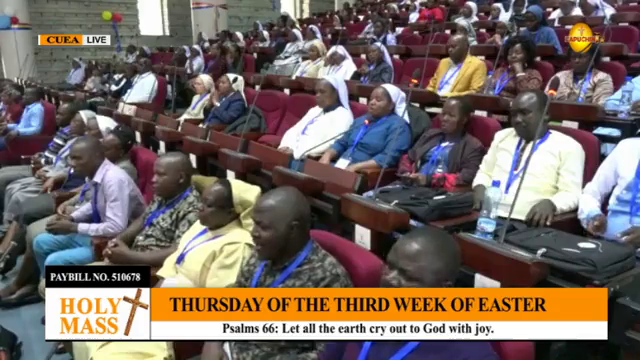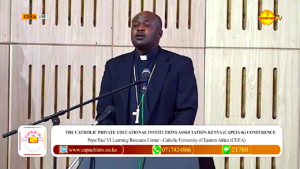KENYA: Consciousness Formation is Vital for Learners: Kenyan Prelate to Catholic Teachers

Sr. Jecinter Antoinette Okoth, FSSA
A Kenyan Bishop during the Catholic Private Education Institutions Association (CaPEIA) conference, has reminded educators that formation of the conscience of learners is their key responsibility since “a teacher is the first person outside a child’s family to have a unique role in the child’s life.”
In his presentation on Wednesday, April 18, Bishop Cleophas Oseso Tuka of Nakuru Diocese pointed out that since teachers are privileged to interact with learners at such an early age, it is of great importance they “design and apply distinctive educational skills and extracurricular activities that stress the importance of moral and spiritual values,” a step that will result in awakening the consciousness of learners.
Recounting how parents could instruct children to be aware of their internal and external existence for consciousness realization, Bishop Oseso who is the Chairman of the health department at the Kenya Conference of Catholic Bishops (KCCB) said, “When growing up, we were advised to always listen to that inner voice (the voice of God), and when we listen to it and follow it, we will often be at peace with God.”
He continued, “On the contrary, when we don’t listen to it and go against it, it condemns us, triggering feelings of shame, regret, anxiety, and even fear. This is what we call conscience.”
According to the Bishop, every parent’s wish is to raise a child with a conscience who will be in a position to distinguish between right and wrong and this is the continuous reminder from the Catholic Church, “that if our conscience isn’t well-formed, we aren’t well-equipped to determine right from wrong.”
To fulfil the scripture message from Proverbs 22:6 which says, “Train up a child in the way he should go: and when he is old, he will not depart from it,” the Prelate who has been at the helm of Nakuru Diocese since February 2023, underscored that in a Catholic school environment, learners should be equipped with three skills.

Learners need to be equipped with the capacity to recognize right from wrong, Bishop Oseso highlighted the first skill for moral value that is needed from childhood and explained, “The importance of teaching values to children is that it helps them to choose the right ways and avoid the evil ones. Everything we do in schools should be focused on increasing students’ knowledge and skills.”
The other skill required for learners is the moral reasoning process. As teachers or parents, the Prelate said, “This skill provides learners with the tools to decide on ethical problems and how to engage in ethical dialogue.”
He narrated further in reference to Gaudium et Spes a pastoral constitution that resulted from the Second Vatican Council on the Church in the modern world saying, “By engaging students in a moral dialogue, a teacher helps them to think about why it is good to do one thing over another.”
The third skill learners need to equip themselves with from Catholic Schools is the capacity for judgment.
“This is the movement from seeing and thinking to action and commitment for a conscience is incomplete until it is acted upon,” Bishop Oseso shared with the participants on the last day of the CaPEIA conference that was held at the Catholic University of Eastern Africa (CUEA) adding that “Moral judgment is not learned overnight but takes reasonableness, years of practice, thoughtfulness, and an ability to weigh moral values from a multiplicity of angles.”
In his address, the Bishop emphasized that by providing these key skills to learners, “teachers in catholic schools perform the crucial task of assisting in the formation of Catholic conscience to learners who face complex ethical issues in their lives and so prepare them to make good moral judgments.”
The realization of good moral judgments is nourished by prayer, enlightened by study, structured by the Gospel, and guided by the teachings of the Church, the Bishop disclosed and reminded educators that the Catechism of the Catholic Church stresses prayer, studying the Word of God, listening to the teachings of the Church, seeking the advice of wise and prudent people, and avoidance of anything that can distort conscious to be applied in forming the conscience.
The Local Ordinary of Nakuru noted further that “An uneducated conscience can easily make a wrong decision,” which the Catholic catechism expresses that conscience can remain in ignorance or make erroneous judgments.


